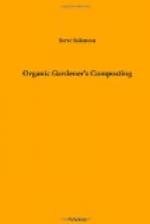“Artificial fertilizers lead to artificial nutrition, artificial animals and finally to artificial men and women.”
Do you want to be “artificial?” Rodale’s contentious Organic Front makes readers feel morally deficient if they do not agree about the vital importance of recycling organic matter.
“The Chinese do not use chemical fertilizers. They return to the land every bit of organic matter they can find. In China if you burned over a field or a pile of vegetable rubbish you would be severely punished. There are many fantastic stories as to the lengths the Chinese will go to get human excremental matter. A traveler told me that while he was on the toilet in a Shanghai hotel two men were waiting outside to rush in and make way with the stuff.”
Perhaps you too should be severely punished for wasting your personal organic matter.
Rodale began proselytizing for the organic movement about 1942. With an intensity unique to ideologues, he attacked chemical companies, attacked chemical fertilizers, attacked chemical pesticides, and attacked the scientific agricultural establishment. With a limited technical education behind him, the well-meaning Rodale occasionally made overstatements, wrote oversimplification as science, and uttered scientific absurdities as fact. And he attacked, attacked, attacked all along a broad organic front. So the objects of his attacks defended, defended, defended.
A great deal of confusion was generated from the contradictions between Rodale’s self-righteous and sometimes scientifically vague positions and the amused defenses of the smug scientific community. Donald Hopkins’ Chemicals, Humus and the Soil is the best, most humane, and emotionally generous defense against the extremism of Rodale. Hopkins makes hash of many organic principles while still upholding the vital role of humus. Anyone who thinks of themselves as a supporter of organic farming and gardening should first dig up this old, out-of-print book, and come to terms with Hopkins’ arguments.
Organic versus establishment hostilities continued unabated for many years. After his father’s death, Rodale’s son and heir to the publishing empire, Robert, began to realize that there was a sensible middle ground. However, I suppose Robert Rodale perceived communicating a less ideological message as a problem: most of the readers of Organic Gardening and Farming magazine and the buyers of organic gardening books published by Rodale Press weren’t open to ambiguity.
I view organic gardeners largely as examples of American Puritanism who want to possess an clear, simple system of capital “T” truth, that brooks no exceptions and has no complications or gray areas. “Organic” as a movement had come to be defined by Rodale publications as growing food by using an approved list of substances that were considered good and virtuous while shunning another list that seemed to be considered ‘of the devil,’ similar to kosher and non-kosher food in the orthodox Jewish religion. And like other puritans, the organic faithful could consider themselves superior humans.




